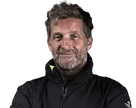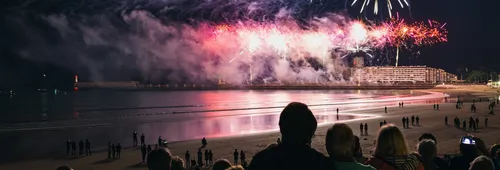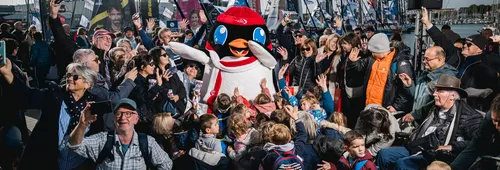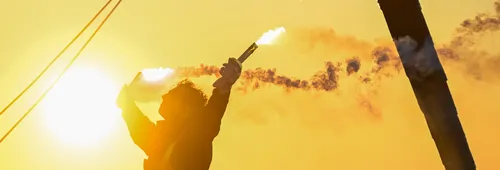Éric Bellion: "I learned that I am a happy man"
This Wednesday mid-morning, Éric Bellion, skipper of Stand as One – Altavia, arrived back in Les Sables d'Olonne after 93 days of sailing around the planet. Sadly mechanical problems meant he had to stop in the Falklands and so although he sailed solo round the globe he does not rank as a finisher. He was not able to follow up on his excellent ninth in the 2016-17 Vendée Globe, first rookie.
It was exactly a month ago, on January 12, that Bellion made the difficult decision to retire from the event when he was in 29th place. The deck fitting of the J2 forestay which he had recently repaired, had given way again and was jeopardizing the safety of the mast. With the prospect of strong winds - 30 knots on average and gusts of up to 50 knots in the South Atlantic - he diverted to Port Stanley, in the Falklands Islands.
But he was determined to finish his solo circumnavigation and so returned to sea out of the race on 16 January.
Bellion has been sailing a David Raison designed IMOCA he conceived with Jean Le Cam, built in a simple way and at a lower cost. Together they wanted to show that it is still possible to race a new boat at moderate, accessible costs.

Vendée Globe :
When you set off on a solo round the world race, you know that you're bound to have to deal with technical problems. But did you have any inkling this might be a problem?

My two damages are, I think, damages associated with a relatively young boat. The first concerns the rudder system. It's a system that we had already tested in the Transat Anglaise, in difficult conditions, especially with the rough seas on the Grand Banks. We really thought that this solution was validated... but not at all. For the record, the first bit broke off the coast of Madeira. I replaced it, but all the others gave way at the entrance to the Southern Ocean. It was hell. We had to find a solution, knowing that it was not possible to hold the "handlebars of the motorcycle". We had a very complicated Indian Ocean and unfortunately, I wasted a lot of time fixing it... and to repair my sails too. These first damages made me lose a lot of ground.
Vendée Globe :
On January 1st, you are told that icebergs are on your route. How did you experience this moment?
That day, I did receive a message from the Race Director: 'Happy New Year, there are two icebergs ahead of you.' That's when a certain anxiety starts, because we know that they are there... but without really knowing where. I've seen icebergs before, I've sailed in the middle of them before, but with steel expedition boats. I love these huge lumps of ice , it's beautiful. The problem is that our IMOCAs are only 3.6 millimetres thick carbon. If you hit a growler or even a simple block of ice, you break the boat... And in these frigid waters, it can be fatal. The worst part was the waiting. Where were they exactly? It is impossible to know precisely. Then, while I was inside the boat, I discovered it, just to my right... only a few miles away! If some skippers were petrified when they saw an iceberg, I, on the contrary, it kind of freed me. At least I finally knew where exactly it was!
Vendée Globe :
And then on the 12th January you announced your retirement. But on shore there was an incredible solidarity in the Falklands. Tell us about it?
It was all a nightmare. Going to the front of the boat, in the open sea, trying to prevent the sail from unfurling... It was a real total hell. I found myself in the most notorious place in the Falklands. If I had lost control I would have ended up on the rockss. It's really a very bad memory. But I was incredibly lucky. 25 years ago, I went on a world tour with two friends, Brice and Hervé. Brice has taken up residence in Patagonia, he has known a lot of people there and he is the one who orchestrated all the solidarity to welcome me there. The craziest thing is that I had already been to the Falklands... for rudder damage, 25 years ago! So it is a bit of a repeat! It was really hell and, honestly, if I had to do it again, I wouldn't do it again. Luckily, I was surrounded by very professional and calm people. It was when I saw the serenity in their eyes that I found the courage.
Vendée Globe :
And so what did this Vendée Globe teach you?
The first thing that this race taught me was that I am a happy man. And that's new for me. In 2016-2017, I was single, with a motorcycle and a backpack. Today, I have a wife, a little girl, a dog, a house. And I realized how happy all these things have made me. It's a blessing, but at the same time, it was all kind of complicated to manage in my head at the beginning of the race. I felt a sadness that I hadn't anticipated, a kind of emptiness that stayed with me for a while. But in hindsight, this sadness meant that I was happy. I also trusted my instincts a lot. Eight years ago, it took me a long time to dare to listen to myself and trust myself. This time, I sailed by relying on myself, and I understood that I really had good instincts. I learned so many things: about my boat, about my emotions, about sadness and disappointment... and especially on how to live with them, to accept them while continuing to move forward. I still have a lot to digest. The Vendée Globe is the unknown. Every day, we find ourselves in incredible situations, in extreme loneliness, extreme fear, extreme discomfort. So inevitably, you learn more about yourself than in the comfort of daily life on land.
Vendée Globe :
And are you going to go back?
I have to talk about it with Marie, my wife, first, but yes, I'd love to come back. What's great now is this frustration. In 2016-2017, I arrived satisfied. I had never done a solo race in my life, and yet I finished first rookie, 9th, after having lived a total adventure, completely crazy. This time, I come back with a different feeling. I'm not finished. My boat is extraordinary. I can still sharpen it, progress further, and do a better prepared, much better round the world race. That would be amazing. And then, we have such a unique boat, more committed to another path. I have my convictions. I am convinced that ease of use, lightness, simplicity... That's the future. And I still want to race and defend these values.
Vendée Globe :
Does the concept of IMOCAs without foils still seem relevant to you?
We caught a bit of a cold this time. The foilers gave us a good beating. It would be interesting to see what the race would have been like without the low pressure system they caught in the South Atlantic, and if they had sailed in the same conditions as us. It's clear that there's a big gap now, but it's also an extreme path. If the Vendée Globe were to be raced only on these boats, it would mean that I and many others would no longer be able to participate. Fortunately, this race is still very diverse, and performance is not just about speed. With Jean Le Cam, we are convinced that this boat represents the future, that of reason. As the famous phrase of the Leopard says: "For nothing to change, everything must change." I don't know if our concept is the one of the future, but in any case, we had the merit of offering something different. I think it's an interesting path, and I'm waiting to see other innovations emerge. I'm sure that Charlie Dalin's record will be beaten, because we always know how to go faster, always further... But will we be able to do better with less? That's not certain.







